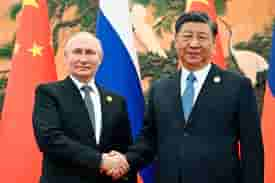In a complex geopolitical landscape, the Gaza Strip emerges as a focal point of contention between major powers, notably China, Russia, and the United States. The recent “Al-Aqsa Flood” operation by Hamas against Israel has intensified the conflict, prompting China and Russia to challenge the U.S.’s role as the primary mediator. Both nations expressed concerns about a perceived plan to divide the Gaza Strip.

China, Russia, and Israel’s Strategic Maneuvers in the Gaza Strip
Chinese media, official newspapers, and the country’s special envoy to the Middle East have highlighted the dangerous situation in Gaza. Russia, through President Vladimir Putin, has emphasized the necessity of addressing the global reach of the United States. Both nations have criticized Israel strongly, accusing it of illegal use of white phosphorus bombs and placing blame on the U.S. for escalating tensions in the region.
China and Russia aim to leverage their alliances in the Middle East, such as with Iran and Hezbollah, to thwart the purported plan to fragment the Gaza Strip and displace its residents forcibly. The historical context of China’s support for Palestinian resistance movements, dating back to Mao Zedong, adds a layer of depth to their involvement.
The Israeli strategy of dividing and controlling the Gaza Strip aligns with a broader plan to undermine the two-state solution and consolidate Israel’s hold on Palestinian territories. The ongoing military operations and attempts to eliminate Hamas signify Israel’s long-term goals. The international community, particularly China and Russia, has condemned these actions and called for a unified Palestinian front.
As the Chinese and Russian envoys provide emergency humanitarian aid to Palestinians, their diplomatic moves seek to portray them as responsible actors addressing a humanitarian crisis. This contrasts with their portrayal of the U.S., which is accused of ignoring Palestinian rights and contributing to the suffering in Gaza.
The role of China and Russia in resolving the Palestinian crisis could be crucial, especially if they can exert pressure on the U.S. Their involvement may increase during the conflict, allowing them to play a more significant role in ending hostilities and securing their economic interests in the region. However, their approach risks unsettling Israel and challenging its plans for the Gaza Strip.
In conclusion, the complex dynamics involving China, Russia, and the U.S. in the Gaza conflict underscore the broader geopolitical chessboard at play. The fate of the Gaza Strip hangs in the balance, as major powers jockey for influence and attempt to shape the future of the region.
















